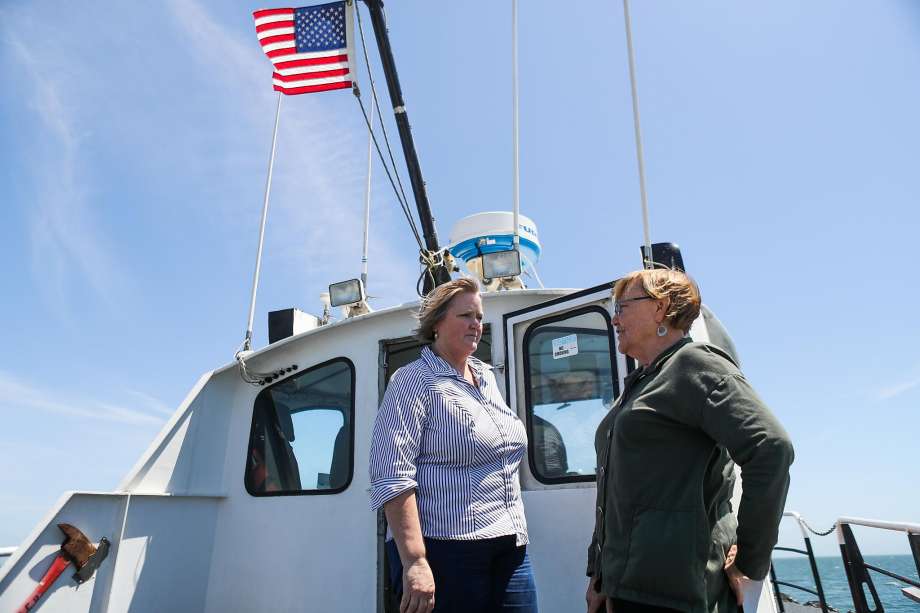By Carl Nolte
San Francisco Chronicle
WWR Article Summary (tl;dr) Very unique article about a tugboat firm out of San Francisco run by WOMEN! It Hasn’t always been easy for two female executives in the maritime business, but Westar Marine has survived and thrived. They do all kinds of work — the traditional work in assisting ships in docking and working as crew boats in construction projects. They run supplies, groceries and sailors out to ships anchored in the bay and offer barge service to carry fresh water, sand, dredge spoils or garbage. They’re even used as platforms for fireworks shows on the Fourth of July.
San Francisco Chronicle
The old San Francisco waterfront of tugboats, big steel launches and barges that can carry anything is alive and well, hidden in plain sight just south of the baseball park.
This is Westar Marine Services, with dockside space and offices at Pier 50, the old Mission Rock Terminal. Westar Marine has 24 tugs, 18 barges, and six water taxis. Westar is a rarity in high-tech San Francisco — an industrial firm owned by women.
It’s a union shop, too. Its boat crews and engineers belong to the International Organization of Masters Mates and Pilots.
There are seven other companies running tugboats on San Francisco Bay, but you’d have to go far to find one as upbeat as Westar. The company began as a one-tugboat operation exactly 40 years ago and developed a niche market, offering a variety of services. They’ll go anywhere and haul anything.
Westar doesn’t own any of the big, powerful and hugely expensive tractor tugs used by large companies like Bay Delta Marine, or Crowley or Foss, all major operators on the bay. Instead, said Mary McMillan Westar’s president, “we buy older boats that are still sound and refurbish them.”
The company’s vessels would not win a tugboat beauty contest. Some, like the Betty L and the Orion, have tall pilot houses built high above the deck and look like saltwater giraffes. Some, like the Baycat, are short and stubby, and others, like the Sagitarian, have an old-fashioned look, like a hipster wearing a double-breasted suit.
They do all kinds of work — the traditional work in assisting ships in docking and working as crew boats in construction projects. They run supplies, groceries and sailors out to ships anchored in the bay and offer barge service to carry fresh water, sand, dredge spoils or garbage. They’re even used as platforms for fireworks shows on the Fourth of July.
“We’re bottom feeders,” McMillan said with a smile. The company has a bit of whimsy about it, too. Westar once named a tug Miss Katie, after the office cat.
However, the company is dead serious, with a number of safety awards and an entrepreneurial spirit. It recently expanded to Seattle.
McMillan and her business partner and company vice president, Wendy Heffron-Morrow, took a reporter and a photographer out on a supply run one windy day last week.
They used the launch Provider, which can carry up to 50 passengers and sometimes works as a water taxi. These floating taxis are an industry service, not generally open to the public.
The run was to take three new life raft devices out to the tanker Evrotas, anchored in the bay, a mile or two off Hunters Point in San Francisco.
“I love this job,” said Chris Panko, the launch skipper. “I’m addicted to boats.”
It was a clear day with a stiff breeze, but Panko said things were never as easy as they looked. “Sometimes it gets rough,” he said, “Once in awhile with water coming over the bow, you’d think you are in a submarine out here.
“We’re coming out here every day to work in nature. Every day is different. Sometimes it’s an adventure.”
The afternoon’s task wasn’t very adventurous, but Panko and deckhand Kevin McCown worked slowly and carefully, rigging up the life rafts, enclosed in plastic containers, attaching them to a hook lowered by the ship’s crew, and watching them lift up the ship’s side, as tall and steep as a steel cliff. They also took three of the devices from the ship.
McMillan talked about her background on the ride out and back. She was originally from the Midwest, she said. She left a librarian’s job in Indiana behind.
Her first job in San Francisco was wrapping gifts at Christmastime at the old I. Magnin store. She worked in Financial District offices and hated it. Then she signed on with Harold “Buzz” Heffron, who owned a plastics business. Heffron also liked boats and had branched out into the maritime business with a single tugboat.
“I was the Girl Friday,” McMillan said.
When Buzz Heffron died in 1985, McMillan teamed up with his daughter Wendy, and they bought the company. “The company needed organization, and I was a good organizer,” McMillan said.
It wasn’t always easy for two female executives in the maritime business. “When we first got on the executive committee of the Marine Exchange, they still had spittoons at the meetings, and men smoked cigars at the Christmas party,” McMillan said. “It’s different now.”
And there’s a world of difference on the waterfront now. It’s not just Mission Bay and the UCSF campus. The area around Pier 50 is turning into a residential neighborhood, with new hotels, apartments and condos.
“We are like a little island here,” she said.
The new city is growing right at their doorstep. Can high-tech neighbors and tugboats mix?
“I hope so,” McMillan said. “This used to be a maritime city. We really want to stay in San Francisco.”














































































































































































































































































































































































